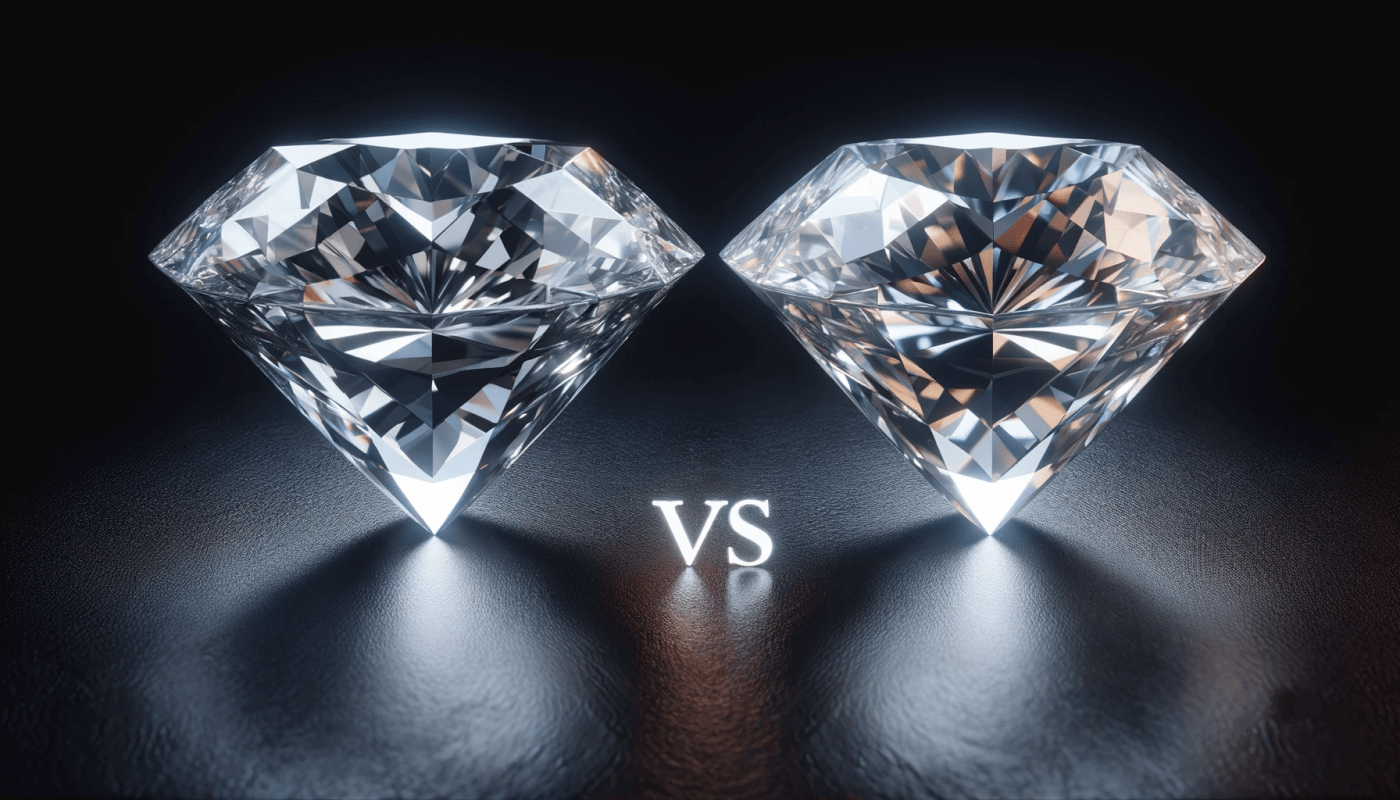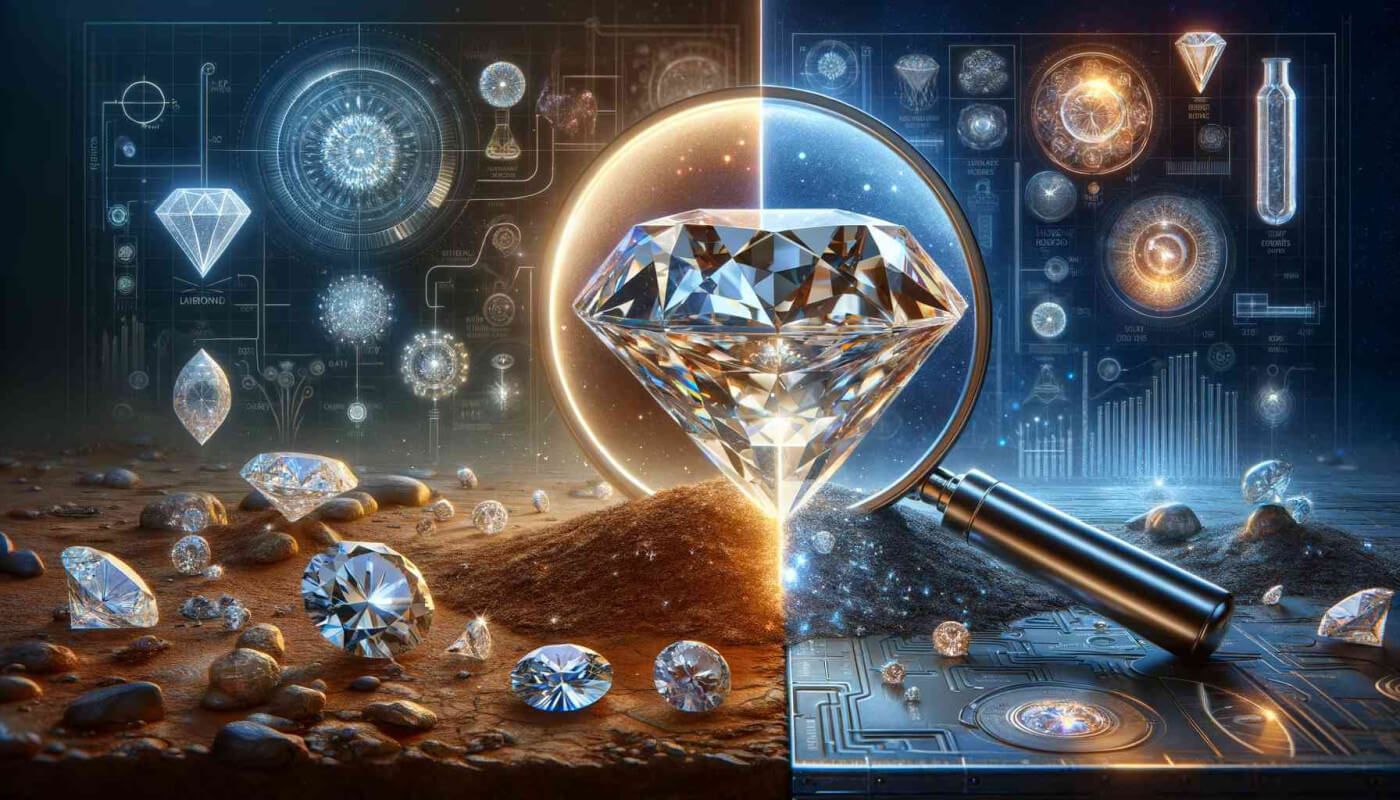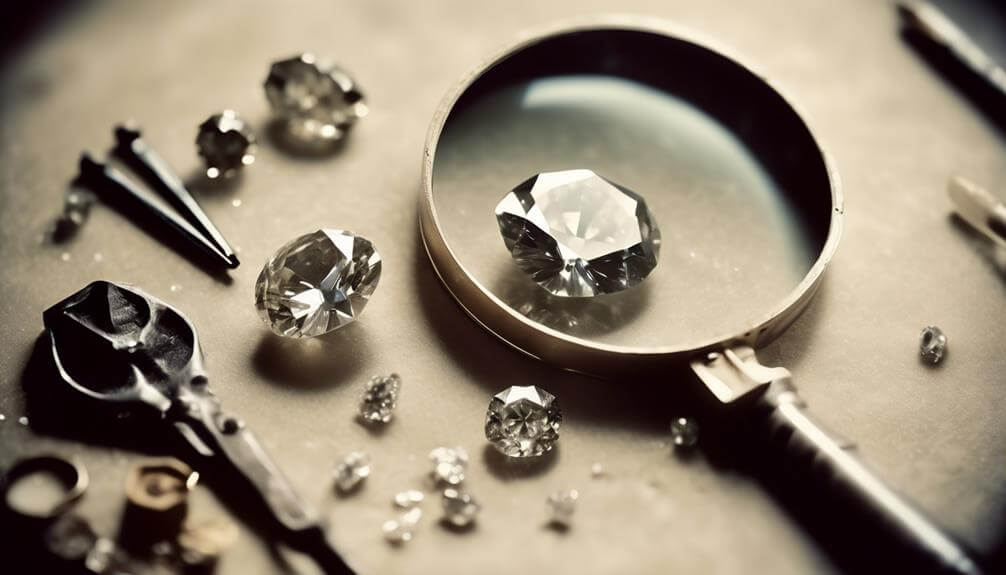As you stand before the shimmering crossroads of choice, the question isn't just which diamond shines brighter, but which reflects the essence of who you are. You're not simply buying a stone; you're embracing a symbol that resonates with your personal narrative. Lab-grown vs. natural diamonds: have you decided which is your choice? If not, let us explore the question together.
Natural diamonds, born from the earth's embrace, speak to a legacy of timeless allure. Yet lab-grown diamonds, with their modern origins, echo a commitment to innovation and conscious consumption. You're part of a community that values both heritage and progress, seeking a gem that aligns with your ethos.
As you weigh the nuances of sparkle and substance, your decision will illuminate your path, uniting you with others who share your vision of beauty and responsibility.
Let's uncover the facets of this diamond dilemma together and find the lustre that best illuminates your world.
Key Takeaways About Lab-Grown Vs. Natural Diamonds
• Lab-grown diamonds are created in a lab in a matter of weeks, while natural diamonds are formed by nature over billions of years.
• Lab-grown diamonds have the same visual appearance and chemical composition as natural diamonds.
• Lab-grown diamonds are not considered 'fake' diamonds, as they are made of carbon like natural diamonds.
• Lab-grown diamonds may have a lower cost compared to natural diamonds.
The Genesis of Diamonds
You'll discover that the genesis of a natural diamond began over a billion years ago, deep within the Earth's mantle, whereas a lab-grown diamond's journey starts in a controlled scientific environment mere weeks before it reaches your hands.
The diamond formation process for natural gems is a marvel of nature, involving intense heat and pressure that transforms carbon into the coveted stones. In contrast, lab-grown diamonds emulate this process, using advanced technology to precipitate the same transformation in a fraction of the time.
Diamond mining extracts these natural treasures, often at a substantial environmental and ethical cost. As you seek to find your place within the tapestry of diamond enthusiasts, understanding these origins can guide your choices, aligning them with your values and sense of community.
Lab-Created Vs Earth-Mined
As you weigh the merits of lab-created versus earth-mined diamonds, consider the profound differences in their origins and the ripple effects each choice has on the world. The genesis of diamonds sets the stage for a debate that's more than just sparkle deep.
Lab-created diamonds, emerging from modern alchemy, satisfy market demand with less environmental impact than their earth-mined counterparts. Yet, the allure of natural diamonds, formed over eons, holds a timeless appeal and potential for long-term value.
You're part of a community grappling with ethical consumption. Your choice between lab-created and earth-mined diamonds shapes the industry's future. It's not just about owning a gem but also about the values you embrace and the legacy you support. Choose wisely, for your decision reflects more than just personal taste.
£910.00
Experience the simplicity of love with the Maya Lab Diamond Bezel Solitaire Engagement Ring, crafted in the UK with the finest materials. This ring features a stunning 1.00-carat G/VS-graded lab-grown diamond in a bezel setting that accentuates the diamond's brilliance.… read moreMaya Lab Diamond Bezel Solitaire Engagement Ring 1.00ct G/VS 18k White Gold

£1,736.00
Evaluating Visual Similarities
When comparing lab-grown and natural diamonds side by side, you'll find it's nearly impossible to distinguish between them with the naked eye. Both sparkle with the same fire and brilliance, reflecting your desire to belong to a community that values both beauty and ethics. The distinguishing characteristics lie deep within their origin stories, not in what you can see. Consumer perception often leans on the romanticized allure of natural diamonds, but lab-grown diamonds are carving out their own space in the hearts of ethical and modern consumers.
|
Aspect |
Natural Diamond |
Lab-Grown Diamond |
|
Formation |
Earth-Mined |
Lab-Created |
|
Visual Appearance |
Identical |
Identical |
|
Chemical Composition |
Carbon |
Carbon |
|
Time to Create |
Billions of Years |
Weeks |
|
Ethical Consideration |
Variable |
More Controlled |
Pricing: Affordability Factor
Your quest for the perfect diamond inevitably leads you to consider the affordability factor, a pivotal aspect that distinguishes lab-grown diamonds as the more budget-friendly choice without compromising on sparkle. The Lab Grown Diamond Market offers stones that are typically more accessible, making the dream of owning a diamond more attainable for many.
A cost comparison highlights that lab-grown diamonds can cost significantly less—often around 35%—of their natural counterparts' price. This price variance means you can potentially select a larger, higher-quality diamond for the same investment.
As you seek a sense of belonging in the world of diamond enthusiasts, remember that opting for a lab-grown diamond doesn't isolate you; rather, it connects you to a forward-thinking community that values ethics, sustainability, and smart spending.
£1,230.00
Experience the magic of love with the Nancy Lab Diamond Halo Pear Engagement Ring, designed to dazzle your senses. This ring boasts 1.10 carats of G/VS-graded diamonds, including a pear-cut diamond at the centre surrounded by a diamond halo. There… read moreNancy Lab Diamond Halo Pear Engagement Ring 1.10ct G/VS in 18k White Gold
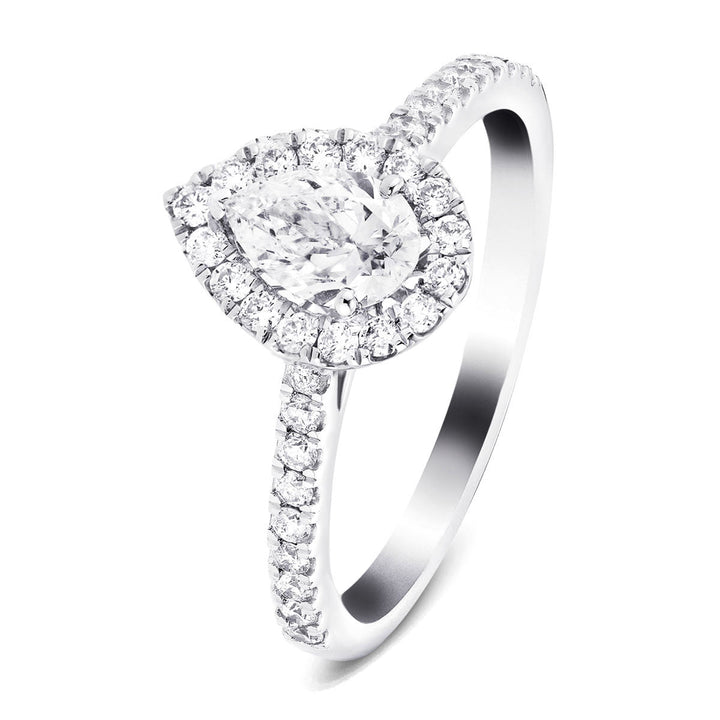
£2,351.00
Value Retention Over Time
You'll find that while the upfront costs of lab-grown diamonds may be substantially lower, their ability to retain value over time often pales in comparison to natural diamonds. When considering a diamond as a long-term investment, it's crucial to think about resale value.
• Resale Value:
• Natural diamonds:
• Historically maintain or increase in value
• More desirable in the secondary market
• Lab-grown diamonds:
• Face significant depreciation
• Less sought after for resale
As you seek a sense of belonging in the world of fine jewellery, remember that natural diamonds, with their timeless allure, not only symbolize a deep connection but also serve as a steadfast investment, resonating with an inherent legacy.
£9,385.00
Add an extra touch of luxury to your collection with this dazzling Lab Diamond Solitaire Necklace Pendant. The pendant is made of 18k yellow gold. It boasts a gorgeous round solitaire diamond weighing 4.00 carats, graded D/VVS by IGI. With… read moreLab Diamond Solitaire Necklace Pendant 4.00ct D/VVS in 18k Yellow Gold
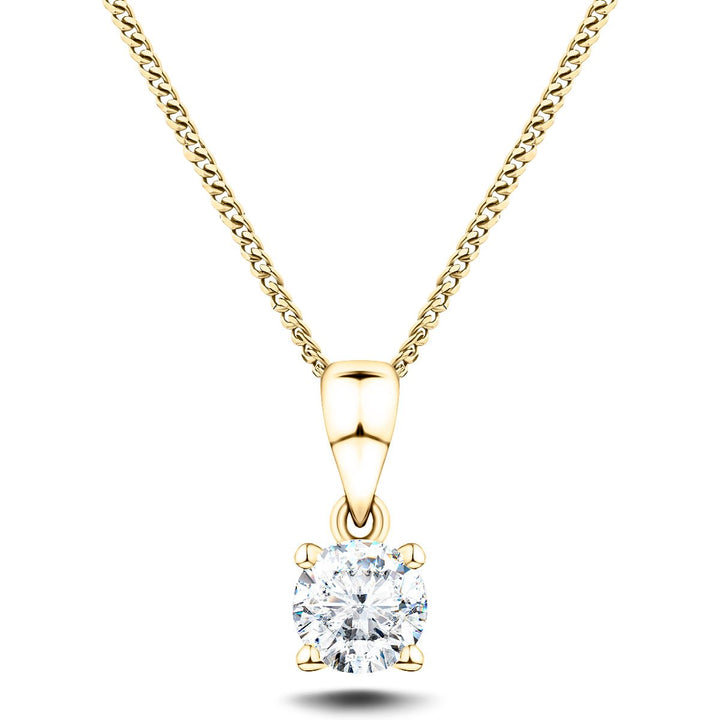
£17,906.00
Ethical and Environmental Impact
Every choice you make has a significant impact, and opting for a lab-grown diamond can greatly reduce the ethical and environmental concerns associated with traditional diamond mining. You're not just buying a gem; you're aligning with ethical sourcing and taking a step towards minimizing your carbon footprint. Here's a snapshot comparison:
|
Aspect |
Lab-Grown Diamonds |
Natural Diamonds |
|
Ethical Sourcing |
Controlled, transparent |
Variable, can be conflict-ridden |
|
Environmental Impact |
Lower carbon footprint |
Higher due to mining |
|
Eco-Conscious Choice |
Yes, less disruptive |
No, can harm ecosystems |
Being knowledgeable about these impacts allows you to make choices that resonate with your values, fostering a sense of belonging in a community committed to sustainability and responsibility.
Market Trends and Resale
As market trends shift, you've likely noticed that resale values for lab-grown diamonds typically fall short compared to their natural counterparts. This discrepancy stems from enduring consumer preferences and the allure of rarity that natural diamonds represent. Of course, natural diamonds can rarely be resold for the same price as when they left the jeweller's shop! A diamond expert friend put it to me like this: A lower resale price for lab-grown diamonds means little against the fact that the diamonds cost half the price in the first place.
He was right. Of course, not many people ever resell their diamond jewellery making the resale price much less relevant than the initial purchase price!
As a member of the diamond enthusiast community, you understand that market demand dictates resale prospects. While natural diamonds have historically held their value due to their perceived scarcity and timeless appeal, lab-grown diamonds face depreciation, akin to many technological products, as advancements in creation methods may make older stones less desirable.
By analysing this dynamic, you recognize the importance of making an informed decision that aligns with your values and investment goals. In the diamond market, a sense of belonging comes not only from the stone's beauty but also from its story and potential to endure across generations.
Selecting Lab-Grown Diamonds
While you're considering lab-grown diamonds, it's essential to assess their quality and long-term value against your personal preferences and budget. The following factors have a significant impact on the market growth for lab-grown versus natural diamonds:
• Lab grown diamond popularity and consumer preferences
• Ethical considerations: Many of you're increasingly mindful of the ethical implications of mining.
• Environmental impact: You're also weighing the ecological benefits of lab-grown diamonds.
When selecting a lab-grown diamond, it's crucial to delve into the specifics. You're not just looking for a dazzling piece; you're seeking a symbol of commitment and belonging that aligns with your values.
The popularity of lab-grown diamonds reflects a community's shift towards sustainable and responsible choices. Remember, you're not just buying a stone; you're becoming part of a conscious movement.
Future of Diamond Buying
You'll find that the future of diamond buying is increasingly leaning towards personalized experiences and informed choices between lab-grown and natural diamonds. As you seek a sense of belonging and identity in your purchases, customized designs tailored to consumer preferences will become ever more significant.
|
Natural Diamonds |
Lab-Grown Diamonds |
|
Time-honoured tradition |
Modern innovation |
|
Earth's gifts, billions of years |
Ethical, eco-conscious choice |
|
Heirlooms with history |
Customizable for your unique story |
In this landscape, you're empowered to make ethical decisions that resonate with your values. Whether you're drawn to the allure of the earth's natural artistry or the tailored perfection of lab-created brilliance, the diamond market is evolving to reflect your individuality and ethical considerations. Your voice matters in shaping a future where every diamond tells a story—your story.
Frequently Asked Questions On Lab-Grown Vs. Natural Diamonds
How Do Different Insurance Companies Approach Coverage for Lab-Grown Diamonds Compared to Natural Diamonds?
You'll find that insurance companies may vary in coverage due to market trends and consumer perception, often equating lab-grown diamonds with natural ones, despite the potential difference in long-term value.
Are There Specific Storage or Care Considerations That Differ Between Lab-Grown and Natural Diamonds?
You'll find that both lab-grown and natural diamonds require similar care; they're both safe for ultrasonic cleaning and can undergo the same chemical cleaning processes without damaging their structure or sparkle.
How Do Professional Jewellers and Diamond Experts Personally Feel About the Rise of Lab-Grown Diamonds in the Industry?
You've noticed that some jewellers exhibit professional scepticism towards lab-grown diamonds, weighing ethical perspectives on sustainability against tradition. They're analysing how these stones fit into the industry's future and customer desires for belonging and authenticity. Other, more open-minded and customer-oriented companies, such as AfterDiamonds, have embraced lab-grown diamonds.
Can Lab-Grown Diamonds Be Considered for Investment Purposes, Similar to Natural Diamonds, Given Their Growing Popularity?
You're plunging into a sparkling sea of diamonds, but for investment, lab-grown gems differ. Market trends show their valuation isn't as robust as natural's, making them a riskier bet for long-term returns.
How Has the Introduction of Lab-Grown Diamonds Influenced the Design and Creativity of Jewellery Pieces by Contemporary Designers?
You're witnessing a creative renaissance in jewellery as lab-grown diamonds boost design flexibility, allowing designers to ethically push boundaries without straining resources and fostering a sense of belonging in a forward-thinking community.
£9,495.00
Experience the ultimate in luxury with this Ella Lab Diamond Solitaire Engagement Ring, featuring a 4.00ct D/VVS-graded lab-created diamond set in platinum. UK designed with an IGI-certified brilliant round diamond and a lifetime workmanship guarantee, this ring is a true… read moreElla Lab Diamond Solitaire Engagement Ring 4.00ct D/VVS Platinum
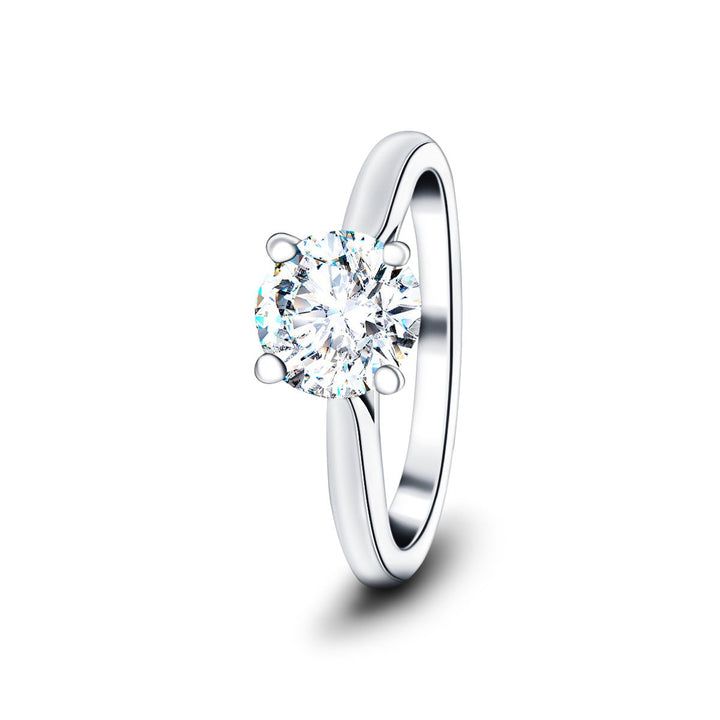
£18,116.00
We Know Which We Prefer
And you're still reading this article. Thanks for going along the journey with us!
In the end, it's like choosing between stars and satellites: both light the night, yet one is born of the cosmos, the other human ambition.
While lab-grown diamonds glitter with modernity and a lighter price tag, natural gems hold the weight of history and tradition.
Your decision reflects not just taste but also your stance on progress and heritage.
As the diamond narrative unfolds, may your choice reflect the brilliance you seek in life's celebrated moments.
